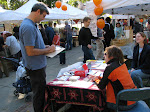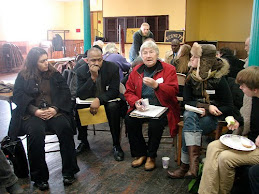What does organizing a faith and justice network look like?
Christ-centered organizing means reflecting on the call of Jesus and the concrete needs of our communities, building relationships, and bringing people together to give voice to God’s desire for justice. Watch the stories of two Christian leaders, Lisa Sharon Harper and Rachel Anderson, who helped build faith and justice networks in Boston and New York.
Christ-centered organizing means reflecting on the call of Jesus and the concrete needs of our communities, building relationships, and bringing people together to give voice to God’s desire for justice. Watch the stories of two Christian leaders, Lisa Sharon Harper and Rachel Anderson, who helped build faith and justice networks in Boston and New York.
Core Practices
- Spiritual Formation: small group gatherings, Bible studies within local churches, and city-wide gatherings to encourage and inspire a deeper commitment to Biblical justice.
- Education and Training: city-wide public gatherings to learn about issues of justice and how to connect with active organizing efforts, and training events that help people develop skills to organize and bring about social justice.
- Community Organizing: mobilizing members to reach tangible, local outcomes
- Advocacy: collaborative links local organizing to regional, state and/or national issues in partnership with key advocacy organizations
Best Practices of Regional Faith and Justice Groups
- individual membership with opportunities for local church and institutional sponsor and partnership
- addressing multiple justice issues, while focused on distinct campaigns at a given time
- identify issues through intentional relationships and listening campaigns
- select issues and non-partisan campaigns that reframe Christian public engagement to move beyond historic lines of division
- partner closely with existing local organizations in development of campaigns
- a representative leadership team identifies strategy and undertakes action on campaigns
- working alongside local churches to inspire, unite and equip lay leaders and clergy for common mission
- particpation with National Faith and Justice Network to share knowledge, experience and materials; increase visibility of model and stories of Faith and Justice groups; shared action; associate with national organizational partners
Participation
- Affirm the core values of NFJN
- Send at least one staff and board member to an annual NFJN consultation.
- Annual contribution of 1% of operating budget to the national effort.
Opportunities
- Small group and church education curricula that are foundational for organizing and action
- A one-week intensive course on poverty and economic justice with a strong focus on racial justice and reconciliation
- An annual organizing training conference uniquely suited to equipping emerging faith and justice organizations






